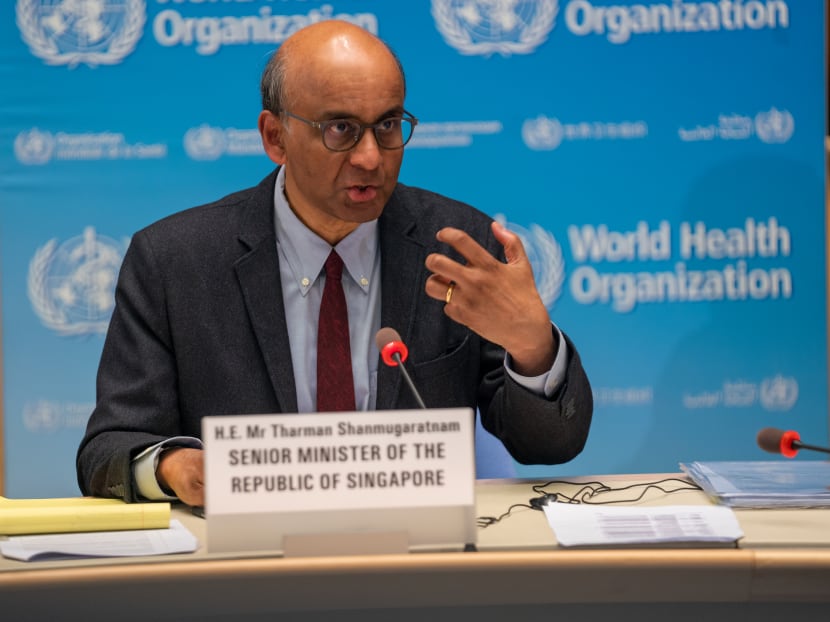Preparing for the next pandemic requires ‘new way of thinking about international cooperation’: Tharman

Senior Minister Tharman Shanmugaratnam at a press conference at the WHO headquarters in Geneva. (Photo: WHO)
SINGAPORE: Global health security is "dangerously underfunded" and the World Health Organization (WHO) needs more support to deal with the next pandemic, which could come at any time, said Senior Minister Tharman Shanmugaratnam on Wednesday (Aug 25).
Preparing for the next pandemic, which may be more devastating than COVID-19, therefore requires a “new way of thinking about international cooperation”, he said at a joint press conference with WHO director-general Tedros Ghebreyesus in Geneva.
They had discussed recommendations of the G20 High Level Independent Panel (G20 HLIP) on Financing the Global Commons for Pandemic Preparedness and Response. The panel is co-chaired by Mr Tharman, WTO director-general Ngozi Okonjo-Iweala and former US Secretary of the Treasury Lawrence Summers.
“We have to move away from thinking about funding for global health security in terms of foreign aid, towards thinking about it as a strategic investment that all nations must make, not only for the good of the global community but because it is in each nation’s self-interest,” Mr Tharman said.
"It is about collective investments in the global public goods that all nations benefit from, rich and poor."
These include building global capacities in early warning systems and the One Health system - an approach by the WHO to achieve better public health outcomes - and ensuring a scaled-up and globally distributed manufacturing capacity for vaccines and other supplies.
Related:
Mr Tharman added that there is also a need to help low- and lower-middle-income countries to invest in national capacities to prevent and detect outbreaks at their source and to halt a pandemic.
“These national capacities benefit those individual countries that have the capacities, but they also benefit the rest of the world,” he said.
VACCINATION AN URGENT PRIORITY
Amid the COVID-19 pandemic, Mr Tharman stressed the importance of vaccinating the world's population.
"The first and most urgent priority is to implement the action plan set out by the WHO, IMF and their multilateral partners to vaccinate at least 60 per cent of every country’s population over the next year," he said.
Mr Tharman noted that the world is vulnerable to both a prolonged COVID-19 pandemic, with repeated waves affecting all countries, as well as to future pandemics.
"We can fix this," he said.
"The resources that need to be mobilised are larger than nations have collectively been willing to commit in the past. But they are very small investments compared to the costs of prolonging the current pandemic, and tiny compared to the costs of the future pandemics that we can avoid."
WAYS TO STRENGTHEN MULTILATERALISM
In order to invest in global public goods on the scale required to prevent the next pandemic, there is a need to strengthen multilateralism, said Mr Tharman.
This includes strengthening support for the WHO through stronger, more reliable funding, as well as increased assessment-based contributions, he added.
“There is no solution to pandemic security that does not involve a strengthened, empowered and financially secure WHO,” Mr Tharman said.
Related:
Mr Tharman also spoke about repurposing international financial institutions – both to bolster countries’ preparedness in normal times and to respond quickly when a pandemic happens.
Noting that the International Monetary Fund, the World Bank and multilateral development banks have the ability to catalyse domestic investments by national governments and leverage private sector investments, he said: “We have to make financing of global public goods for resilience against climate change as well as pandemic security, part of the core mandates of these international financial institutions”.
Mr Tharman noted that current funding for global health is raised by the individual global health organisations on a “siloed” basis. It is also “largely dependent” on discretionary bilateral aid.
“The result is a non-system of complex, inefficient, unpredictable, and greatly inadequate funding,” he explained.
The panel he co-chairs has therefore proposed the establishment of a new multilateral funding mechanism for global health security called the Global Health Threats Fund.
It is aimed at mobilising at least US$10 billion (S$13.5 billion) a year from the international community, Mr Tharman said.
“That sounds like a large sum but US$10 billion spread across a large number of countries on a fair and equitable basis means national contributions that are less than one-thousandth of the annual budgets of almost all countries,” he said.
The Global Health Threats Fund will fund existing institutions and networks, as well as prioritise and reprioritise based on the “needs of the times”, he added.
To ensure financial oversight and better governance, the panel proposed an inclusive, G20-Plus board comprising health and finance ministers.
Mr Tharman stressed that the world cannot prevent recurring pandemics through incremental reforms to individual institutions.
"We must instead strengthen multilateralism," he said.
“The collective investments required as part of this deal are affordable. They will help us avoid blundering into pandemics again and again," he added.
"We’ll have to proceed with urgency. It will be economically and politically myopic and morally indefensible to defer the collective actions and investments that are in both the global interest and the national self-interest everywhere.”





